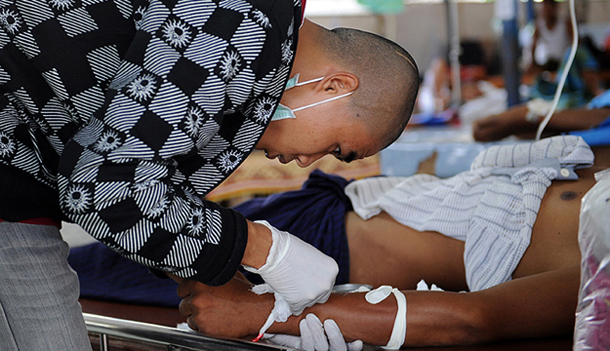The Mae Tao Clinic will no longer be able to provide dry food rations to some 3,000 children in Mae Sot if a shortfall in funding is not met by next week, it said on Monday.
“Due to a recent change in our funding, we no longer have money to continue providing dry food rations to around 3,000 displaced children staying in boarding houses around Mae Sot,” the clinic announced on its website. “If we don’t receive emergency funding or provisions soon, we will have to stop our Dry Food Programme as soon as next week.”
The Mae Tao Clinic at the Thai-Burmese border treats about 130,000 Burmese people every year free of charge. It was founded in 1989 by an ethnic Karen physician, Dr. Cynthia Maung, after thousands of refugees fled into Thailand following a violent crackdown on pro-democracy demonstrators in Rangoon the year before.
Dr. Cynthia Maung told The Irrawaddy on Tuesday that the clinic has lost some of its donors since international agencies began shifting their their financial support to projects inside Burma. One major donor, Norwegian Church Aid, has not approved its funding to the clinic for the year 2012.
“Some of our regular donors now want to focus their support inside Burma,” she said. “But our patient numbers are growing and the number of schoolchildren is always increasing.”
The clinic’s current budget stands at 120 million baht (US $4 million), 85 million baht of which goes toward the clinic’s various health care programs. Some 25 million baht is set aside for education and facilities for children; the rest of the budget is stretched to fund the construction of schools and new facilities, said Dr. Cynthia.
Mae Tao also provides direct financial support to one school in Mae Sot, but also facilitates funding for 78 other local schools which host about 17,000 students and provide jobs for no less than 700 teachers.
Now it is feared that the affected children will have to drop out of schools and move back to their villages in eastern Burma where they may not have the opportunity to continue their education and face other risks in the war-torn region.
The clinic has asked for public donations such as rice, oil, tinned fish and beans, as well as monetary donations. It says it costs 300 baht ($10) a month to provide one child with minimal dry food rations.
On Tuesday, Dr. Cynthia Maung is scheduled to attend community health care talks with Aung Min, a prominent Burmese government peace negotiator.
Most of the patients and schoolchildren that the Mae Tao Clinic treat and take care of are Burmese migrant workers or from refugee camps, including the Mae La camp, with a population of some 40,000, where Burmese democracy leader Aung San Suu Kyi visited on June 2.
Suu Kyi, who is currently touring Europe, said in her recent Nobel Peace Prize acceptance speech that many of the refugees she met in Mae La refugee camp spoke of their concern over “donor fatigue,” which she said could also translate as “compassion fatigue.”
“I appeal to donors the world over to fulfill the needs of these people who are in search—often it must seem to them a vain search—of refuge,” said Suu Kyi in Oslo.
Speaking to The Irrawaddy in Oslo about the change of international donor policy, Harald Bøckman, a founding member of Norwegian Burma Committee, said, “You cannot just turn your back to them [refugees] and abandon them … it would be unfair and irresponsible.”

















